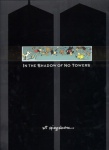
In September, Pantheon Books will publish Art Spiegelman's comic strip musings on 9/11 and its aftermath, In the Shadow of No Towers. Spiegelman, of course, is the author of Maus, a key book in the development of the modern graphic novel, as well as the editor (along with his wife Francoise Mouly) of Raw, the award-winning anthology of avant garde comics. But for most of the decade before 9/11 Spiegelman wrote essays and drew covers for the New Yorker rather than take up the arduous task of creating comics. The traumatic events of September 11, which took place in close proximity to his lower Manhattan home, were just the beginning of the experience for Spiegelman, who grew increasingly upset at his own government. Writing in his introduction to In the Shadow of No Towers, 'I hadn't anticipated that the hijackings of September 11 would themselves be hijacked by the Bush cabal that reduced it all to a war recruitment poster...When the government began to move into full dystopian Big Brother mode and hurtle America into a colonialist adventure in Iraq -- while doing very little to make America genuinely safer beyond confiscating nail clippers at airports -- all the rage I'd suppressed after the 2000 election, all the paranoia I'd barely managed to squelch immediately after 9/11, returned with a vengeance.'
Furious at the direction the United States was taking Spiegelman returned to cartooning, and in spite of the fact that he 'never wanted to be a political cartoonist,' he began exploring and explicating the post 9/11 world in a series of oversized, full color two-page spreads, a format that echoes the early newspaper comics, which were born in the 1890s on Park Row, just a few blocks from ground zero. Spiegelman found solace in the adventures of the Yellow Kid, in the anarchic antics of the Katzenjammer Kids, and in the lyrical absurdism of George Herriman's Krazy Kat and these vintage comic strips inform In the Shadow of No Towers in numerous ways. The result is a 42-page collection, which mixes early twentieth century cartoon characters and twenty-first century political controversy. When Spiegelman began producing these anguished musings on the trauma of 9/11 and America's reaction, only one U.S. mainstream paper, the small circulation weekly, Forward, carried them (see 'Spiegelman Returns to Comics with 9-11 Strip'), but in the context of an election year, Americans have at last begun to engage once again in no holds barred political debate, and in the current climate In the Shadow of No Towers should find a ready audience among those who believe that America has lost its direction in the aftermath of 9/11.
Pantheon is planning a major marketing push for In the Shadow of No Towers including an eight-city author tour, and a national advertising campaign in the New York Times, the Los Angeles Times, the New Yorker, and key alternative newspapers.


